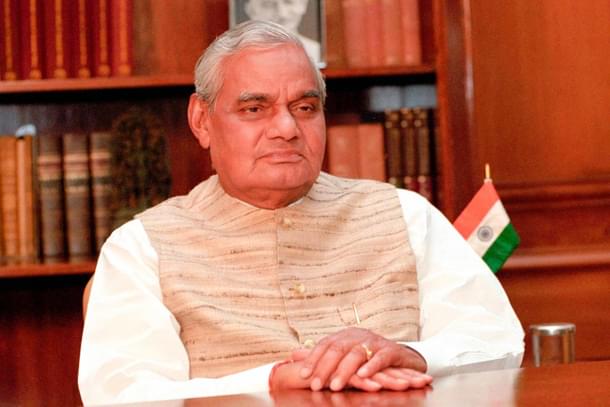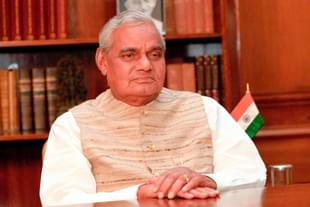Blogs
Atal Bihari Vajpayee: Keeping Alive A Stalwart’s Legacy
Gopi CP
Dec 24, 2018, 11:47 PM | Updated 11:47 PM IST
Save & read from anywhere!
Bookmark stories for easy access on any device or the Swarajya app.


It has been a little over four months now, since India lost one of its tallest political leaders since Independence. With Atal Bihari Vajpayee’s passing away, a gloom descended on the nation at large, and his supporters.
They showed their adoration for him by naming roads, schemes and awards after him, and started a few governmental schemes in his memory.
But, is there a better way to remember him and celebrate his life?
In families, legacy of the departed member is kept alive by recalling their qualities at key moments. Communities, too, celebrate the legacy of important leaders who are no more. But such ‘organic’ practices may not last for a long period with the celebration of the legacy confined to the family or community, without impacting the society at large.
Nations have tried ‘inorganic’ ways to keep legacies alive, but despite the best attempts, the idea of legacy ends up as symbols of pride, and names. There is rarely a systemic way that works to entrench a legacy in public memory for a long time. Only few institutions of excellence have been successful in passing on their legacy through the generations, beyond the rudimentary naming and symbolising.
There is much to learn from these institutions by way of following their best ‘inorganic’ practices to maintain Vajpayee’s legacy, and impact the society and nation now and in the future. If his party, the Bharatiya Janata Party, as an institution were to integrate such practices, they might be able to take his legacy to his followers, but not the nation at large. So how do we institutionalise Vajpayee?
When I say institutionalising Vajpayee, it is about perpetuating his legacy. The answer may lie in three-part strategy:
Part one involves selecting qualities. We look for Vajpayee’s qualities that are unique, admirable, and much needed for nation-building. Vajpayee being a tall leader, had many admirable qualities, but to me, what stood out was his parliamentary conduct, his coalition skills, his objective and party-agnostic support to certain issues, and his acclaimed oratory in the Parliament.
Part two is about choosing who should do this. I strongly feel that any attempt to institutionalise Vajpayee must not be an initiative of the BJP or any politico-religious body, as it may be resisted or not accepted by others with different political and ideological preferences. Such an initiative must be kept disassociated from any single group, so that everyone participates.
However, this could be a government initiative supported by all parties. It may be very tempting to let go of Vajpayee’s legacy from an electoral standpoint. But I am sure that leaders of the BJP can think in the long term, in the interest of passing on the legacy of one of the nation’s greatest leaders to benefit future generations rather than keep the stalwart’s remembrance confined at 11, Ashoka Road or Nagpur.
Part three is how to do this. By building a world-class institution that sensitises and trains panchayat leaders, ward leaders, legislators and parliamentarians on parliamentary conduct, debate, constructive opposition, and more. Picture this… it is a blended course – a mix of physical interactions and digital interventions. It enrolls people in public life not just from India but from all over the world. There are different levels of programmes to suit different levels of experience - from amateurs to veterans. The most important structural element here is that the course is centred on the life and works of Vajpayee, and not a generic import from a text book. The course must be designed using researched principles of adult learning, hence meant to be “effective”. One of the principles, for example, is that adults learn and imbibe from people’s lives than a book of concepts.
What’s the need to do all this? If Vajpayee had been alive, he would have laughed off this idea and certainly not agreed if it was meant for just keeping his name alive. But he would have certainly agreed if it was meant to benefit lawmakers at large. So, the reason is not “popularising Vajpayee”. The reason is that we need to up our game in parliamentary conduct and constructive opposition. If you were to poll citizens, MPs, media, corporates in India, they will unanimously and completely agree that we lack all of this, and if these aspects can be touched up, it would benefit the nation. Vajpayee is respected across the political spectrum, and I’m certain lawmakers from all political parties would want to participate in this programme.
In summary, establishing an ‘Atalji Institute of Parliamentary Excellence’ or ‘Atalji Institute of Democracy’ or ‘Atalji Institute for Legislators’ for lawmakers at all levels to teach parliamentary conduct, and oratorical skills and so on, that will ‘up’ our game of polity, is one sure shot way to perpertuate his legacy. Even if the lawmakers were to take home one new belief or value, we would travel many a mile in nation-building.
Elephants In The Room
First elephant – people might think that this won’t work, as quality of politicians is deteriorating, and they would not want to be a part of this programme. With decades of research in adult learning, I can say that it is a question of finding the motivation, a reason to change. It is challenging, but the world has overcome bigger challenges.
Second elephant – people can be of the opinion that governments do not have the ability or the will to do it. When it comes to ability, there is far too much talent in India to pull this through. As far as the will goes, it is anybody’s guess.
The opinion that nothing can change the lawmakers is easy. Also, naming roads and universities after our leaders is easy to do. But doing things that are easy never builds greatness.
The author works in the field of adult learning, education, leadership by digital means.





